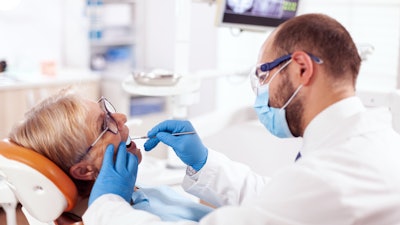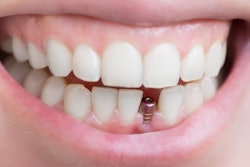
Patients with titanium dental implants experienced less discomfort or pain when the area around the prosthetic was probed compared to those with zirconium implants. The study was published on May 27 in Clinical Oral Implants Research.
Additionally, those who took analgesics felt less pain during peri-implant probing than those who didn't take anything, the authors wrote.
"Patients who had taken analgesic medication experienced less discomfort and pain with peri-implant probing than those who had not; furthermore, titanium implants were associated with less pain than zirconium implants," wrote the authors, led by Peter Eickholz of Johann Wolfgang Goethe University Frankfurt in Germany.
Most often, titanium and titanium alloys are used in dental implants. Though both offer excellent resistance to corrosion in the body, these metals may trigger nonspecific immunomodulation and autoimmunity. Ideally, biomaterials should not cause inflammatory or allergic reactions, which is why zirconium has become an alternative. Zirconium is biocompatible, it can reduce the accumulation of plaque, and it allows bone to grow on its surface, according to the study.
Probing around dental implants may cause some discomfort or even pain for patients. Research has shown that age and probing sequence, like prodding around a tooth or implant first, may affect pain and discomfort. However, other possible factors, like implant material, also may affect these sensations, the authors wrote.
To study this, 70 patients with implants along with a contralateral tooth were included in this research. Of these patients who had a median age of 55, 37 had titanium implants and 33 had zirconium implants. One implant in each patient was analyzed, and probing pocket depth (PPD) and clinical attachment level (CAL) were assessed. Immediately after probing, patients used the visual analog scale (VAS) to rate their discomfort and pain. Then, statistical analysis was completed, according to the study.
The analysis revealed that patients with titanium implants experienced less intense discomfort or pain after probing (p = 0.037). Furthermore, the pain wasn't as intense for those who took an analgesic compared to those who didn't (p = .021), the authors wrote.
Additionally, significantly more patients with titanium implants took analgesics, and these individuals were about 10 years older than those with zirconium implants. However, age and analgesic medication were independent factors in this model, the authors wrote.
Nevertheless, the study had limitations, including that the perception of pain varied between individuals, which made it difficult to compare implant materials among different patients, they wrote.
"Peri-implant probing caused less discomfort/pain in (1) patients who had taken analgesic medication compared with those who had not and (2) patients with titanium implants compared with those with zirconium implants," Eickholz et al wrote.




















